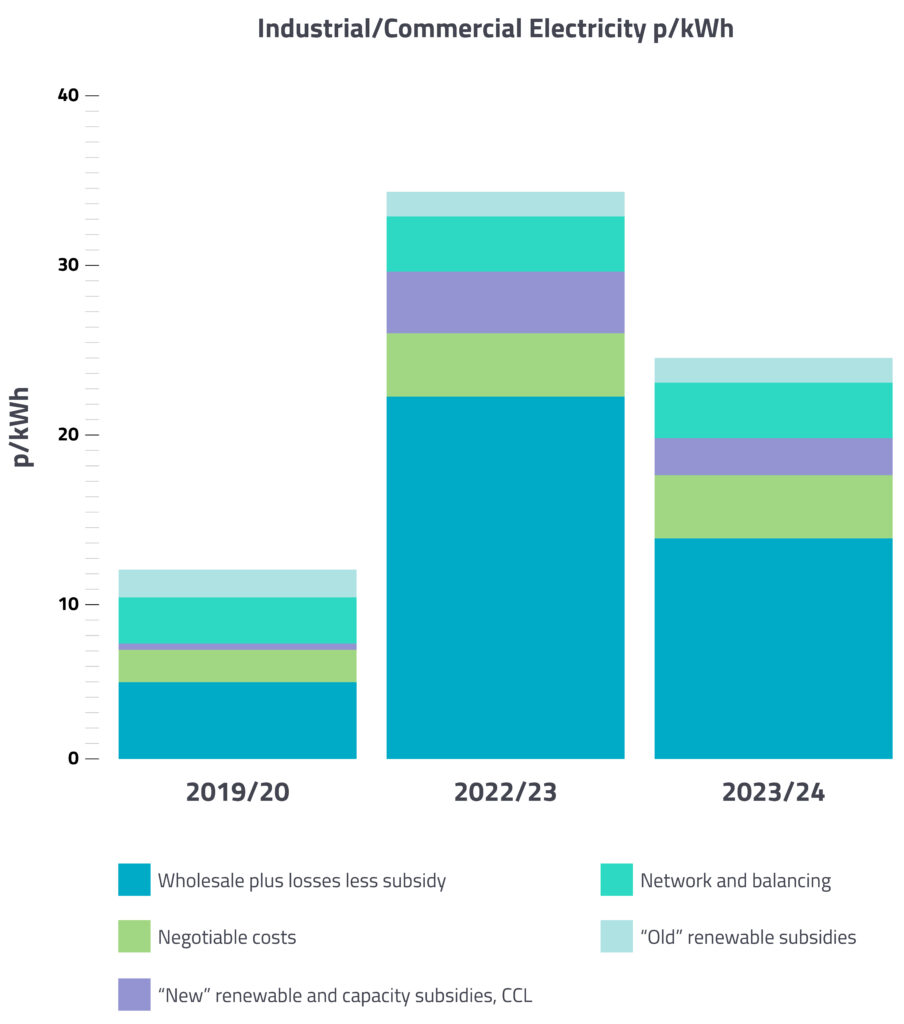“The energy crisis is over but I’m still being asked to pay more than double the normal cost for my next electricity contract – why are my costs still high?”
Wholesale electricity costs reached record levels in 2022 and are still ≈9p/kWh higher than they were four years ago. The UK power price has been driven up by higher European gas prices because we need gas to produce ≈40% of our electricity and even though it’s only 40%, gas sets the price of UK power. Gas prices remain inflated because the UK and Europe have lost their cheap supplies from Russian pipelines, exacerbated by the war in Ukraine.
Negotiable costs have risen by ≈2p/kWh but for specific customers the increase could be significantly more. These include supplier’s margin, cost risk premium and credit risk premium; the Broker’s commission; and the cost of renewable energy.

What can I do about it?
- Wholesale electricity costs are fixed and can’t be negotiated but you can choose to spread them and benefit from smarter purchasing. All you need is some good, trustworthy advice so you can make an informed decision. For example, smaller customers should discuss energy prices with their energy advisor and pick the best time to fix rather than waiting until their contract is about to end. For larger customers, who started buying in the wholesale market twenty years ago, this is the time to start to really manage energy price volatility by questioning the static approach of the past and adopting a newer dynamic approach.
- When it comes to these ‘negotiable charges’ – the easiest way to reduce your costs is to ask your energy broker to disclose their fees or commission before they act for you and then negotiate them if you are not happy. Never give them authority to sign supply contracts on your behalf as this opens the door to cost being artificially inflated and fees being hidden. Confirm their actual commission with the energy supplier as not every supplier shows commission in the supply contract.
- Keep an eye on the cost of renewable energy being offered by suppliers. This “green” energy traditionally cost a tiny amount more than “brown” energy, however, as demand for “green” electricity has increased faster than the supply of “green” power, the generators have been able to attract a premium for the “green certificates.” For the customers, this can mean paying as much as 1p/kWh extra for renewable electricity. Clearly there are other considerations about the decision around renewable energy such as ESG commitment and carbon reduction targets to be considered.
- Following changes to the “network and balancing charges” levied by National Grid and the local network companies, discuss with your energy consultant about whether you are paying for more electricity capacity than you need. If so, you can reduce your “per kVA” charge immediately, however you can only reduce your “banded” charge in exceptional circumstances so you may have to wait until April 2026 to see a lower “banded” charge.
Time to take action
In recent weeks concerns around rogue energy brokers who rip off companies for millions of pounds in hidden commission fees has made headline news. A coalition representing 1m small businesses has urged the energy regulator, Ofgem to force gas and electricity suppliers to disclose how much they are paying the intermediaries. OFGEM have just proposed a new licence condition that will require suppliers to disclose brokers’ commissions to all business customers, not just micro businesses.
At Noveus Energy we are 100% committed to transparent fees and our consultants will explain how they reduce the price you pay and try to minimise the risk of unexpected charges or penalties, ensuring clients only pay the right amount for their energy charges.
If you’d like to discuss any of the above, please get in touch via our website contact page.

